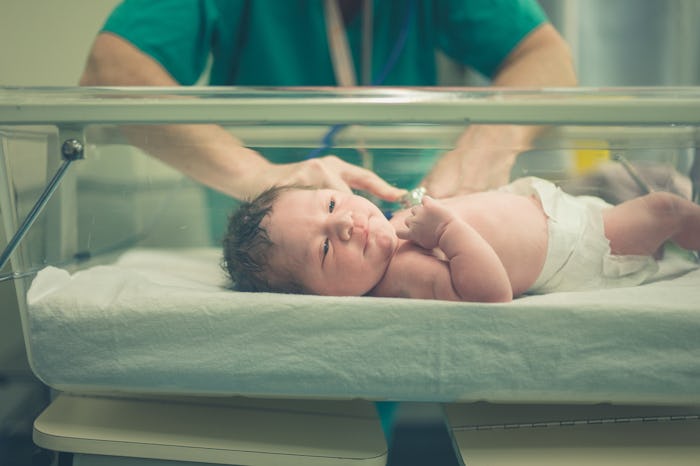Life
The Troubling Reason Newborns Now Need The Hepatitis B Vaccine Within The First 24 Hours Of Life
New recommendations on how soon parents and pediatricians should protect otherwise healthy newborn babies from potential exposure to hepatitis B have been issued due to the drastic rise in opioid addictions. The American Academy of Pediatrics cited concerns over more potential carriers of the viral illness because of the epidemic — and, therefore, there is a greater risk that babies will be exposed to hepatitis B at birth. As such, physicians and pediatricians now recommend newborns get hepatitis B vaccines within the first 24 hours of life. And according to the organization’s official statement, the timing of the vaccine has become critical; earlier recommendations allowed parents the option to delay the vaccine by as much as a week, but because infants are so vulnerable, their latest set of recommendation are far less flexible.
Hepatitis B is a viral infection that attacks the liver and causes both short and long-term health problems including liver disease and cancer, according to the World Health Organization. It is spread through blood contact, and most commonly spread from mother to child during birth.
The hepatitis B vaccine is delivered to infants in a series of three needle injections, according to the Centers for Disease Control. The first was typically delivered at birth or by the first newborn medical visit, according the agency, with two booster shots delivered by the time a child is between 6 and 18 months old.
Together, the series offers as much as a 90 percent rate of protection against the hepatitis B virus, according to the CDC’s website.
But the deepening opioid crisis means that more babies could be exposed to the virus before their mothers are aware that they are at risk. Earlier this year, the CDC reported a 116 percent rise in the number of hepatitis B cases in Kentucky, Tennessee, and West Virginia. Those same states are among those at the center of the opioid epidemic, and health advocates are concerned that as drug addiction and overdoses rise, so will the likelihood that more babies will be born to mothers unaware they carry the blood-borne disease.
Adequate prevention for infants will therefore hinge on reaching every newborn before they might be exposed to the virus, which means counseling more mothers-to-be before they give birth about the potential risk of spreading hepatitis B — and vaccinating every newborn as quickly as possible.
In an official statement posted to the group’s website, Dr. Flor Munoz, member of the AAP Committee on Infectious Diseases, said the vaccine should be the first administered to every infant:
It is important that no newborn leaves the birth hospital without it. We encourage pediatricians to advise expectant mothers about the need for their babies to receive the birth dose of the hepatitis B vaccine.
In its official statement, the AAP recommended certain steps for neonatal teams to reach as many infants as possible within the first 24 hours of birth. First, doctors should work to identify and treat any pregnant women who test positive for the virus prior to delivery, communicate her health status to her labor team, and document it in the baby’s medical records. After the baby is born, the recommendations differ based on the baby’s weight and whether his or her mother has tested positive for the disease:
- For infants born to mothers who tested negative for hepatitis B, all infants who weigh more than 2000 grams [roughly 4 pounds, 6 ounces] should receive the vaccine within the first 24 hours after birth. For babies who weigh less than 2000 grams, the vaccine should be given to them at 1 month old, or at the time of discharge from the hospital – whichever comes first.
- For infants born to mother who tested positive for hepatitis B, all newborns, regardless of birth weight, should receive the first dose of hepatitis B vaccine and hepatitis B immunoglobulin at birth
Finally, the AAP recommends that physicians notify birth hospital records that the vaccination occurred, and file records in the appropriate CDC Immunization Information Systems and state immunization registries.
People who test positive for the disease have a 15 to 20 percent chance of developing a serious liver condition over time, including liver cancer, according to a separate CDC report. And more than 3,000 people in the United States die each year from liver disease related to hepatitis B infections.
Still, despite the solid evidence that vaccines do far more to protect public health than any potential or perceived harm they could cause, any recommendation that involves vaccinating more babies, or the idea that parents will have less say over whether their child will get a vaccine, will likely be met with some criticism.
The good news is that the evidence suggests that the hepatitis B vaccine is safe for infants: The CDC reported that more than 100 million people have gotten the vaccine since it became available 35 years ago, and no serious side effects have been linked to the immunization. While that is encouraging, the better news one day will be this history of safety will hopefully make it easier for parents and doctors to work together for the sake of infant health.
